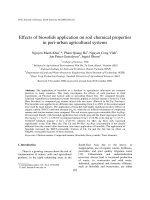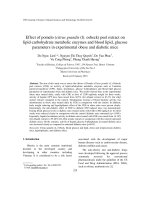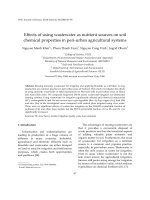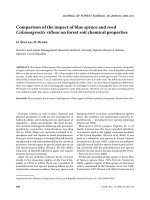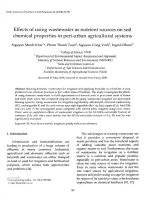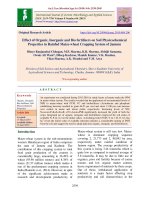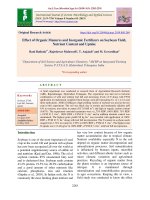Effect of lime, organic and inorganic fertilizers on soil chemical properties and yield of chilli (Capsicum frutescens l.)
Bạn đang xem bản rút gọn của tài liệu. Xem và tải ngay bản đầy đủ của tài liệu tại đây (137.46 KB, 7 trang )
AGU International Journal of Sciences – 2019, Vol 7 (3), 84 – 90
EFFECT OF LIME,ORGANIC AND INORGANIC FERTILIZERS ON SOIL
CHEMICAL PROPERTIES AND YIELD OF CHILLI (Capsicum frutescens L.)
Nguyen Van Chuong1
1
An Giang University, VNU - HCM
Information:
Received: 19/07/2019
Accepted: 14/10/2019
Published: 11/2019
Keywords:
Chilli, cow manure, NPK,
lime, yield.
ABSTRACT
Five treatments (NT1, NT2, NT3, NT4 and NT5) of organic fertilizer
(processed 10 tons cow manure ha-1),liming (3,5 tons ha-1) and three rates
of inorganic fertilizer (NPK:90-60-60 kg ha-1) were evaluated on soil
chemical properties and yield of chilli. Significant effects of processed
liming, cow manure (CM) and inorganic fertilizer (NPK)rates on nutrient
were obtained. Interaction effects between lime, CM and NPK were
significant. The results indicated that lime, cow manure in combination
with lower doses of balanced inorganic fertilizers led to increases of soil
organic matter, labile soil organic matter and available phosphorous in soil
significantly compared to the control. The maximum yield 1.48 t ha-1 at
NT5 was found under the combined use of 10 tons CM ha-1+ 3.5 tons CaO
ha-1+ NPK. It was also observed that some of the soil chemical properties
were significantly influenced by the application of different treatments of
lime and CM while total available N, available P, available K and OM were
significantly affected by the application of both organic and inorganic
fertilizers in different combinations. The chilli yield of treatments with
organic manure, chemical fertilizers; lime, organic manure, and chemical
fertilizers, created a significant difference compared to control treatments.
The results showed that chilli yield increased significantly from 0.302 tons
ha-1at NT3 (only CM) to 1.48 tons ha-1 at NT5 (10 tons CM ha-1+ 3.5 tons
CaO ha-1+ NPK).
1. INTRODUCTION
consumption as well as for processing and with
its favourable price, there is tremendous
potential for growers to venture into bird chilli
in An Giang. Lack of technology for production
is among the factors limiting cultivation in the
country currently. The An Giang government
recently identified high yielding varieties of
chilli suitable for commercial cultivation and
recommended them as the most suitable for
large scale planting. There is, however, little
Chilli (Capsicum frutescens L.) is one of the
high value commercial crops in An Giang.
Chilli is a popular spice of Vietnam, and is
presently cultivated widely on a commercial
scale in the Mekong delta. The total area under
chilli cultivation is 1,500 hectares with an
annual production of 7.46 tons. With the
increasing demand for chilli for fresh
84
AGU International Journal of Sciences – 2019, Vol 7 (3), 84 – 90
information on the agronomic requirement of
chilli, both locally and elsewhere. This paper
presents the nutrient content and responses of
chilli to liming, organic and inorganic
fertilizers, with the objective of obtaining
information on the fertilizer requirement for
conventional as well as for organic production
of chilli.
Each of the plots was fertilized with a basal
dose of N, P and K at 90:60:60 kg.ha1,(Iruthayaraj
&
Kulandaivelu,1973).The
inorganic fertilizers used were urea, muriate of
potash and single superphosphate. All the lime,
PK and cow manures were applied before
planting except manurewhich was applied in
two split doses. Half the quantity of nitrogen
was applied as a basal dose before planting and
the rest was top dressed 60 days after planting.
Observations on plant height, number of tillers
and leaves/plant were recorded (at 20, 45, 65
days and harvest) and the data were statistically
analysed. Besides observations on per plant, per
plot and per hectare yield of fresh fruits were
recorded and statistically analysed.
2. MATERIALS AND METHODS
Chilli(Capsicum frutescens L.) is AFRICA F1
TN 223 of Trang Nong company. The study
was conducted in My Hoa Hung, Long Xuyen
city, An Giang province.The experiment was
carried out in the field at areas inside the dyke
with 5 treatments:NT1:applied belong to
farmers (NPK:90-60-60 kg ha-1), NT2 (3.5 tons
CaO ha-1+10 tons cow manure ha-1), NT3(10
tons cow manure ha-1)NT4 (NPK+10 tons cow
manure ha-1) and NT5 (3.5 tons CaO ha-1+10
tons cow manure ha-1+NPK) with 4 replicates.
The kind of irrigation water (river water), with
area of each replicate being equivalent to 24m2
(6m x 4m), planted in a single row with
distance of 50cm x 30 cm (three seeds/hole),
the distance between plants is 30 cm and row is
50 cm.
3. RESULTS AND DISCUSSION
The results of pH in soil (Table 1) showed it to
be quite suitable for growing chilli (pH = 6.66)
(Shakeel et al., 2017).The total nitrogen is
average level for chilli (0.188%) (Kramany et
al., 2007).The Available Phosphorous is not
quite low level (30.1 mg/100g)(Kramany et al.,
2007)but available K and poor organic matter
content (0.153 meq/100g) and (2.08%),
respectively were low.
Table 1. Soil particle size distribution and chemical characteristics at the first of the experiment
No.
Characters
Results
1
pHH20
6.66
2
Total N(%)
0.118
3
Available P (mg/100g)
30.1
4
Available K(meq/100g)
0.153
5
OM (%)
2.08
85
AGU International Journal of Sciences – 2019, Vol 7 (3), 84 – 90
Figure 1 . Effect of NPK, cow manune and lime on soil pH before and after of the experiment
Table 2. Soil total N before and after of the experiment
Total N (%)
Treatments
Before
after
NT1 (Control)
0.144a
0.116c
NT2
0.131b
0.142b
NT3
0.112d
0.113c
NT4
0.131b
0.146b
NT5
0.107e
0.153a
*
*
2.47
1.82
F
CV(%)
* Values are the mean of four replicates. Means within each column having different letters,are significantly
different according to LSD at 5 % (*)level.
The results in Figure 1 show that the soil pH
before and after the experiment was statistically
different at 5% level. Due to the application of
3.5 tons of lime per ha in NT2 (lime+cow
manure) and NT5 (lime + cow manure + NPK)
during the fertilizing stage,the pH values in
these treatments there were higher pH values of
the soil than before the experiment. Treatments
using organic fertilizers with variable pH values
ranged from 6.53 to 7.69 and were higher than
treatments with pH values of 6.87 (except for
NT4 treatment).Paweena Rungruksatham &
Lampan Khurnpoon (2016) showed that organic
fertilizer, capable of forming complexes with
iron and aluminum, which helps to raise soil
pH. In general, pH values in treatments were
relatively suitable for the development of chilli
(Muthukrishman,1986).
Total Nitrogen (N): N is a nutritional element
that determines crop yield and the N in each
soil type was dependent on the organic content
in the soil. The soils that contained high humus,
had rich N content (Prasad et al.,2009). The
result in Table 2 showed that soil total N
86
AGU International Journal of Sciences – 2019, Vol 7 (3), 84 – 90
contents after of the experiment range from
0.113% (NT3) to 0. 153 in NT5. Total N
content after the experiment in NT5 was the
highest compared to other treatments.
Dobermann et al., (2000) showed that the total
N content in soil is not much changed with the
agricultural system, and the total N treatments
were average. There were significant
differences between treatments.
Table 3. Effect of NPK, cow manune and lime on available P before and after of the experiment
Available P (mg/100g)
Treatments
Before
after
NT1 (Control)
50.6a
60.7c
NT2
26.6c
97.3a
NT3
19.5e
32.5d
NT4
25.4d
92.7b
NT5
29.6b
92.1b
*
*
2.09
2.87
F
CV(%)
* Values are the mean of four replicates. Means within each column having different letters, are significantly
different according to LSD at 5 % (*)level.
Available Phosphorous (P):P is a character of
soil fertility. High P content of soil is rich
fertility soil, and high fertility soil is rich in P
level (Prasad et al.,2009The results in Table 3
show that available P in soil before and after the
experiment are significantly different according
to LSD at 5% (*) level. The available P in cow
manure treatments ranged from 32.5 mg/ 100g
soil to 97.3 mg/ 100g soil. The available P
content after the experiment in NT2 was the
highest compared to other treatments. Vincent
(1986) showed that P content of organic
fertilizer affects available P over a long period
of time because, when mineralized, organic
matter will release P into soil solution, reduce P
adsorption and increase cell P in soil.
hand, the lowest available potassium was
recorded by only using cow manure with a
highly significant difference when compared to
other treatments (Table 4).The available
potassium of all treatments was significantly
different according to LSD at 5%.
The amount of available potassium is often
correlated with the potassium uptake by plants.
In general, the response to K fertilizer is often
found when the available K content is less than
0.2 meq /100g soil (Landon,1984).
The data in Table 4 shows that available
Potassium in soil samples before and after the
experiment
was
significantly
different
according to LSD at 5%.Available potassium
after of soil in all treatments ranged from 0.12
meq / 100g (NT3)to 0.17 meq / 100g
(NT2).According to Dobermann et al.,(2000),
this available K is low to very low levels.
Available Potassium (K):After the experiment,
the NT2 treatment had the highest available
potassium (0.170 meq/100g). On the other
87
AGU International Journal of Sciences – 2019, Vol 7 (3), 84 – 90
Table 4. Effect of NPK, cow manune and lime on available K before and after of the experiment
available K(meq/100g)
Treatments
Before
after
NT1 (Control)
0.17a
0.14b
NT2
0.15bc
0.17a
NT3
0.14c
0.12d
NT4
0.16ab
0.13c
NT5
0.17a
0.14b
*
*
7.03
3.09
F
CV(%)
* Values are the mean of four replicates. Means within each column having different letters, are significantly
different according to LSD at 5 % (*)level.
Table 5. Effect of NPK, CM and lime on O.M. of chilli before and after of the experiment
OM (%)
Treatments
Before
After
NT1
2.27a
1.31d
NT2
2.16b
1.63a
NT3
2.08b
1.38c
NT4
2.17b
1.67a
NT5
1.91c
1.53b
*
*
2.99
2.10
F
CV(%)
* Values are the mean of four replicates. Means within each column having different letters, are significantly
different according to LSD at 5 % (*)level.
Total Organic Matter (O.M.):The results in
table 5 show that the highest soil organic matter
content (1.67%) after the experiment was
obtained by the liming combined CM and NPK
treatment ,a significant difference with all other
treatments, while the lowest content (1.31%)
was obtained by the control treatment (Table 5).
The O.M. values of chilli range from 1.91% to
2.27% and 1.31% to 1.67% before and after the
experiment, respectively. Many researchers
have confirmed that soil organic matter is a
nutrient source closely related to soil fertility,
especially in hot and humid tropical conditions
(Prasad et al.,2009).
88
AGU International Journal of Sciences – 2019, Vol 7 (3), 84 – 90
Table 6. Effect of NPK, cow manune and lime on yield of chilli
Yield (ton ha-1)
Treatments
NT1
1.08c
NT2
0.430d
NT3
0.302e
NT4
1.28b
NT5
1.48a
F
*
CV (%)
6.0
* Values are the mean of four replicates. Means within each column having different letters, are significantly
different according to LSD at 5 % (*)level.
The treatment consisting of NPK along with
cow manure 10 tons ha-1and liming 3.5 ton ha-1
(NT5) exhibited the highest yield of fresh (1.48
tons ha-1). Balanced nutrition of organic and
inorganic nutrients maintains an optimum ratio
between the nutrients, which is of considerable
importance in improving the yield. The analysis
of variance for yield is presented in Table 6.
Significant effects were obtained for all the cow
manure, liming and inorganic fertilizer (NPK)
applications.
Interaction
effects
were
significant. Mean yields obtained are presented
in Table 5. Yield ha-1 increased significantly
from 0.302 tons at NT3 to a maximum of 1.48
tons at NT5. All growth parameters were
improved when chilli plants received lime and
cow manure. Moreover, a greatincrease of chilli
growth resulted from co-lime with cow manure.
The yield of Chilli increased
5.0 times
compared to the only cow manure treatment
and 1.4 times compared to the control treatment
(applying NPK).The treatment consisting of
NPK along with cow manure 10 tons ha-1and
liming 3.5 ton ha-1 showed the effect of
improving soil fertility on productivity clearly.
and ultimately conserved the environment and
improved sustainability.
Continued application of other levels of lime
and organic matter enhanced yield and reduced
the need to use chemical fertilizer, pesticides
Iruthayaraj, M.R. & Kulandaivelu, R.
(1973).NPK requirements of K 1 Chillies
4. CONCLUSION
Liming, cow manure and NPK had significant
effect on the soil pH, OM, total available N,P
K in soil and were higher than that of the
control. The application of lime combined with
cow manure and NPK increased yield of chilli.
On the other hand, the highest soil total
nitrogen percent and available potassium and
phosphorous, and organic matter content were
obtained by the lime combined with cow
manure and NPK, while the soil available
characters were improved for all treatments.
Additionally, significant differences were
observed between lime, NPK and cow manure
source treatments.
REFERENCES
Dobermann A. and T. H. Fairhurst (2000).Rice:
Nutrient disorders & nutrient management.
Handbook Series. Potash & Phosphate
Institute (PPI), Potash & Institute of Canada
(PPIC) and International Rice Research
Institute (IRRI), 191 p.
89
AGU International Journal of Sciences – 2019, Vol 7 (3), 84 – 90
(Capsicum annuum L.). Indian J. Agron., 13,
22-24.
India; 343-378.
Paweena
Rungruksatham
&
Lampan
Khurnpoon.(2016).Effect of Shade Net and
Fertilizer Application on Growth and
Quality in muskmelon (Cucumis melo. L.
var. reticulatus) after Harvest. International
Journal of Agricultural Technology, 12,
1407-1417.
Kramany M.F.,Bahr Amany A., Manal,
Mohamed
F.
&
Kabesh.M.O.
(2007).Utilization of bio-Fertilizers in field
crops production.16-groundnut yield, its
components and seeds content as affected by
partial replacement of chemical fertilizers
by bio organic fertilizers.Journal of Applied
Sciences Research, 3, 25-29.
Prasad, P. H., Mandal, A. R., Sarkar, A., Thapa,
U. and Maity, T. K.(2009).Effect of BioFertilizers and Nitrogen on Growth and
Yield Attributes of Bitter gourd (Momordic
acharantia L.).International Conference on
Horticulture.
Landon, J.R., (1984).Booker Tropical Soil
Manual:a Handbook for Soil Survey and
Agricultural Land Evaluation in the Tropics
and Subtropics. Cambridge University
Press, 21, 287-297.
Shakeel Ahmad Bhat1,B.A. Pandit,J.N.Khan,R.
Kumar and Rehana Jan.(2017).Water
Requirements and Irrigation Scheduling of
Maize
Crop
using
CROPWAT
Model.App.Sci 6, 1662-1670.
Muthukrishman
C.R.,T.Thanggaraj
and
R.Chatterrejee
(1986).C hilli
and
Capsicum Vegetable crops in india.
Phblished B.Mitra NAYA Prokash
200006 Bidhan Sarani Calcutta 70006
90
